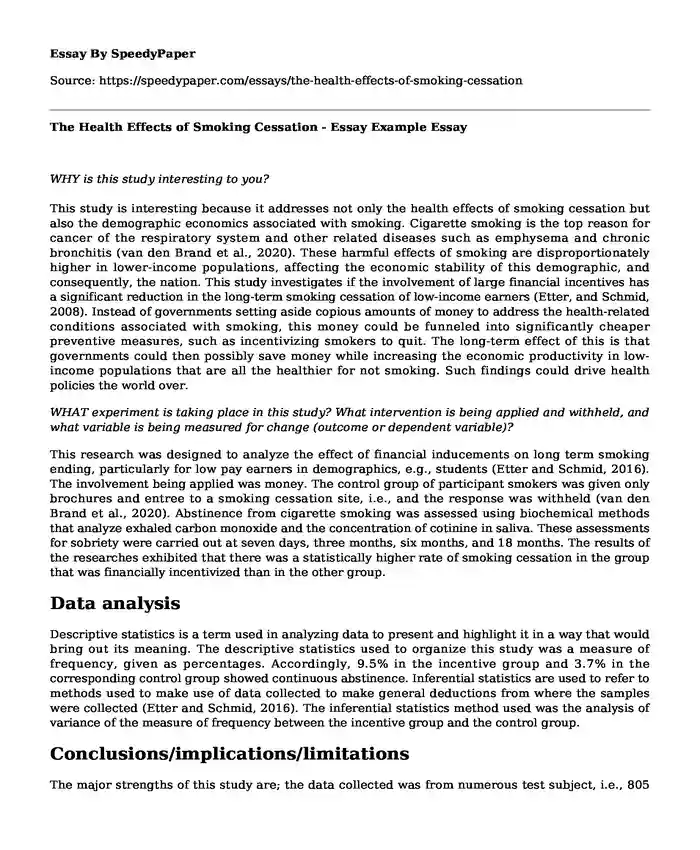
| Type of paper: | Essay |
| Categories: | Healthcare Substance abuse Community health Social issue |
| Pages: | 3 |
| Wordcount: | 623 words |
WHY is this study interesting to you?
This study is interesting because it addresses not only the health effects of smoking cessation but also the demographic economics associated with smoking. Cigarette smoking is the top reason for cancer of the respiratory system and other related diseases such as emphysema and chronic bronchitis (van den Brand et al., 2020). These harmful effects of smoking are disproportionately higher in lower-income populations, affecting the economic stability of this demographic, and consequently, the nation. This study investigates if the involvement of large financial incentives has a significant reduction in the long-term smoking cessation of low-income earners (Etter, and Schmid, 2008). Instead of governments setting aside copious amounts of money to address the health-related conditions associated with smoking, this money could be funneled into significantly cheaper preventive measures, such as incentivizing smokers to quit. The long-term effect of this is that governments could then possibly save money while increasing the economic productivity in low-income populations that are all the healthier for not smoking. Such findings could drive health policies the world over.
WHAT experiment is taking place in this study? What intervention is being applied and withheld, and what variable is being measured for change (outcome or dependent variable)?
This research was designed to analyze the effect of financial inducements on long term smoking ending, particularly for low pay earners in demographics, e.g., students (Etter and Schmid, 2016). The involvement being applied was money. The control group of participant smokers was given only brochures and entree to a smoking cessation site, i.e., and the response was withheld (van den Brand et al., 2020). Abstinence from cigarette smoking was assessed using biochemical methods that analyze exhaled carbon monoxide and the concentration of cotinine in saliva. These assessments for sobriety were carried out at seven days, three months, six months, and 18 months. The results of the researches exhibited that there was a statistically higher rate of smoking cessation in the group that was financially incentivized than in the other group.
Data analysis
Descriptive statistics is a term used in analyzing data to present and highlight it in a way that would bring out its meaning. The descriptive statistics used to organize this study was a measure of frequency, given as percentages. Accordingly, 9.5% in the incentive group and 3.7% in the corresponding control group showed continuous abstinence. Inferential statistics are used to refer to methods used to make use of data collected to make general deductions from where the samples were collected (Etter and Schmid, 2016). The inferential statistics method used was the analysis of variance of the measure of frequency between the incentive group and the control group.
Conclusions/implications/limitations
The major strengths of this study are; the data collected was from numerous test subject, i.e., 805 smokers who were low-income earners, the test subjects were enrolled over an extended period, i.e., from 2011 to 2013 and an incremental financial reward which was offered to the test subjects, a maximum of 1650 US dollars. The limitation that is presented is the lack of in-person visits to the test subjects for the legitimization of the data. The Swiss Tobacco Prevention Fund funded the study (Etter and Schmid, 2016). There might have been a bias in support for the outcome of this study since a positive result would be beneficial to the sponsor.
References
Etter, J. F., & Schmid, F. (2016). Effects of large financial incentives for long-term smoking cessation: a randomized trial. Journal of the American College of Cardiology, 68(8), 777-785. https://doi.org/10.1016/j.jacc.2016.04.066
Van den Brand, F. A., Nagelhout, G. E., Winkens, B., Chavannes, N. H., van Schayck, O. C., & Evers, S. M. (2020). Costeffectiveness and cost-utility analysis of a workplace smoking cessation intervention with and without financial incentives. Addiction, 115(3), 534-545.
Cite this page
The Health Effects of Smoking Cessation - Essay Example. (2023, Sep 10). Retrieved from https://speedypaper.net/essays/the-health-effects-of-smoking-cessation
Request Removal
If you are the original author of this essay and no longer wish to have it published on the SpeedyPaper website, please click below to request its removal:
- Free Essay Sample on Social Worker Values and Biases
- Free Essay on the Use of Performance Enhancing Drugs in Sports
- Free Essay. Radicalism in Movements for Women's Rights
- Cardiovascular Complications: Prevalence & Prevention - Essay Sample
- Financial Concerns - Essay Sample
- Free Essay Example on Human Trafficking
- Witch Hunts and the Beginning of the Sexual Division of Labor in Sylvia Federici's Text - Essay Sample
Popular categories




